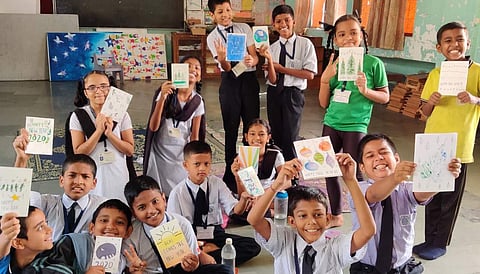

"I started driving only after I began pursuing Mechanical and Automobile Engineering," quips Anand Gopakumar, Co-founder, The Apprentice Project. Anand believes that kids in our education system are forced to select careers based on ranks. In 2012, Anand was working in the Telcom industry in Delhi. He had always had a bone to pick with the herd mentality in institutions.
"The academically superior students are pushed to opt for Medicine or Engineering. The mediocre students are told to follow in their footsteps. I was a mediocre student myself and my teachers would simply tell me not to go bad," Anand shares, adding that with History and Math being his subjects of interest, he would have excelled in Economics, but followed the others into Engineering. "I hated the core subjects," he declares.
In 2015, Anand started working for Teach for India. It was here that he met co-founders Monica Pesswani and Prashant Kumar, and the trio began formulating the idea of education centred around choices and interests. "A lack of electives and choices in their courses is what students from government schools miss out on the most. It is concerning that we haven't been able to provide them with options to explore in terms of skills and career," says Anand. From that outrage, The Apprentice Project (TAP)was born. "We started by introducing co-curricular activities," shares Anand.
The classroom-based learning model signed up the school for the programme, from classes IV-X. The students are put through an "exploration process" where they are shown videos to help them recognise what they are interested in. For the first month, they are asked to go through trial classes in their selected fields and decide if they wish to stick to it. Then, for the rest of the academic year, from August to March, the students are trained in respective clubs by TAP volunteers. Classes are conducted every Saturday for two hours. "The volunteers are industry experts or those who are majoring in the subject. They commit with us for one year," Anand shares. They worked with schools in Pune and Mumbai and claim to have impacted 4,000+ kids.
In 2020, when the pandemic struck, TAP tried to adapt to the scene online and reach their students. "It was miserable," rues Anand, adding, "It is hard as it is to teach things such as dance, drama and arts online. Most of our kids come from low-income families and multiple family members share a single phone. There are network and data issues and the students have no privacy. They often sit in the same room as the rest of the family for their classes and it just doesn't work out,"
TAP decided to harness messaging app WhatApp's business API, WhatsAppBot, and create a gamified system for kids to learn and engage with their interests. The platform is called TAP Buddy, a self-learning programme, where on signing up, a link will guide the student to the chatbot. There, they can select the course and engage in the games, activities and videos that are sent to the phone. These are monitored in real-time and the students' progress is listed on the bot's leaderboard in the form of points or badges. The child has mentor support through groups for feedback.
"They are learning in a very difficult environment right now and keeping them engaged is of utmost importance. Learning shouldn't feel like a task. We have kept the user interface easy. They can just select their way through the process," shares Anand. For their efforts, TAP Buddy was awarded the Harvard President's Innovation Grant. Anand says that the application took six to seven months to process and a jury of international educators and foundations deemed them worthy of the chance to be incubated at the Harvard Innovation Labs, along with a prize of almost $75,000.
